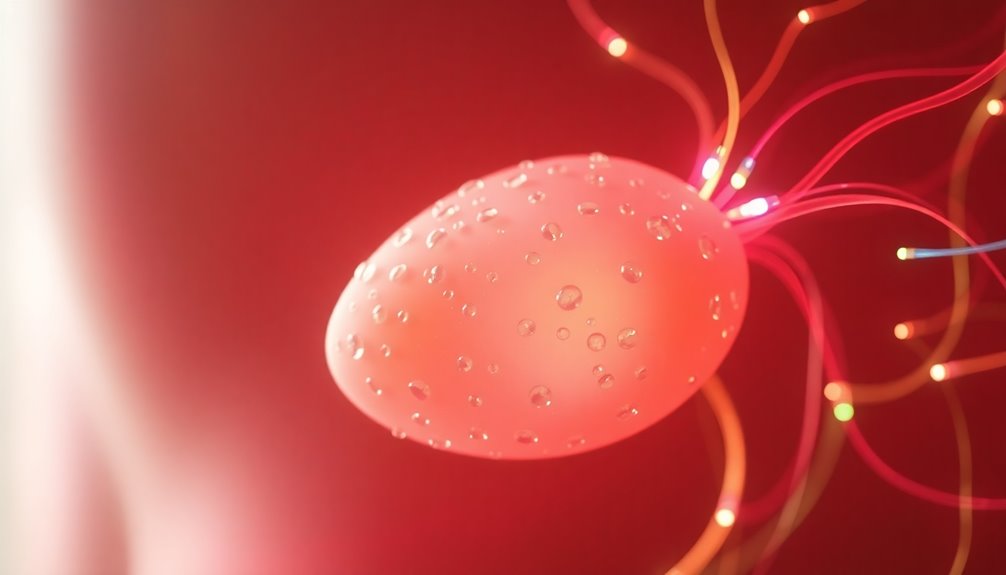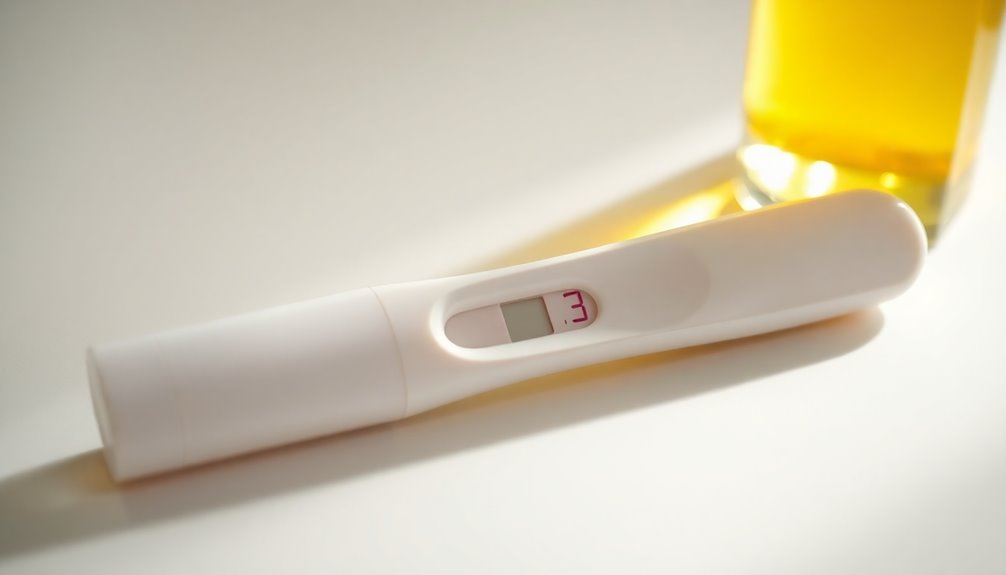After ovulation, a mature egg is released, and if fertilization occurs, beta hCG levels begin to rise considerably. This hormone supports the pregnancy and becomes detectable around 10 to 11 days post-conception. Most home tests can pick it up by 14 days after ovulation. Understanding these changes is essential for evaluating early pregnancy health. Curious about the specific levels or symptoms you might encounter? There's so much more to explore on this fascinating journey!
Key Takeaways
- Ovulation occurs 24 to 36 hours after the LH surge, releasing a mature egg for potential fertilization.
- Beta hCG begins to rise about 6-12 days post-ovulation, indicating successful implantation if fertilization occurs.
- Home pregnancy tests typically detect hCG around 14 days post-ovulation, with levels as low as 5 mIU/mL being significant.
- Normal early pregnancy hCG levels should double every 48 to 72 hours, with trends crucial for assessing pregnancy viability.
- Early pregnancy symptoms, such as fatigue and morning sickness, usually appear around 6 weeks gestation, coinciding with rising hCG levels.
Understanding Ovulation and Its Hormonal Changes

When you understand ovulation, you grasp the complex hormonal changes that play a crucial role in your reproductive cycle.
Ovulation occurs 24 to 36 hours after the luteinizing hormone (LH) surge, releasing a mature egg. After this, the corpus luteum forms and starts producing progesterone, essential for maintaining the uterine lining for potential implantation.
Ovulation happens after the LH surge, releasing a mature egg and prompting the corpus luteum to produce vital progesterone for implantation.
If fertilization occurs, the fertilized egg travels to the uterus and implants 6 to 10 days post-ovulation. This triggers the production of human chorionic gonadotropin (hCG), which can be detected in your blood as early as 8 days after conception.
In early pregnancy, hCG hormone levels typically double every 48 to 72 hours, indicating a healthy response following implantation. Additionally, understanding early detection of potential complications, such as hormonal imbalances, can be crucial for reproductive health.
The Role of Beta Hcg After Ovulation

After ovulation, the role of beta hCG becomes vital for supporting a potential pregnancy. This pregnancy hormone hCG is initially produced by the fertilized egg and later by the placenta.
As hCG levels begin to rise about 6-12 days post-ovulation, they help maintain the uterine lining, essential for embryo support. When implantation occurs, you might start noticing early pregnancy symptoms, signaling that the body is preparing for a developing embryo.
To guarantee a healthy pregnancy, it's important to monitor beta hCG levels, which typically double every 48 to 72 hours in early stages. Significant increases indicate normal development, while declining levels may suggest complications, making hCG monitoring a key component of early pregnancy management. Additionally, understanding the stages of grief can help individuals process any emotional challenges that may arise during this transformative time.
When Does Beta Hcg Become Detectable?

Beta hCG becomes detectable in your body around 10 to 11 days post-conception, which aligns with the timing of embryo implantation. This is when hormone levels rise considerably, marking the early stages of pregnancy.
Beta hCG is detectable about 10 to 11 days post-conception, coinciding with embryo implantation and early pregnancy hormone rises.
While blood tests can detect hCG levels as low as 5 mIU/mL, allowing for sensitive early pregnancy detection, home pregnancy tests typically pick up beta hCG around 14 days post-ovulation, or when you miss your period.
Keep in mind that the timing may vary; individual rates of hCG production can differ considerably among women.
As pregnancy progresses, hCG levels double approximately every 48 to 72 hours, reflecting the body's response to the growing embryo. Additionally, nutrition plays a crucial role in supporting healthy fetal development during this early stage of pregnancy.
Normal Beta Hcg Levels in Early Pregnancy

In early pregnancy, you might notice that beta hCG levels can vary considerably from one person to another.
Typically, you can expect these levels to fall within certain ranges, especially as the weeks progress.
Understanding what's normal helps you gauge whether your pregnancy is developing as it should. Additionally, normal beta hCG levels can provide insight into potential health issues during pregnancy.
Hcg Level Variability
While normal beta hCG levels in early pregnancy can provide important insights, it's vital to understand that these levels can vary greatly among individuals.
Here are some key points regarding this variability in hCG levels:
- Normal beta hCG levels typically range from 5 to over 25 mIU/mL, indicating that pregnancy is possible.
- hCG levels rise rapidly, ideally doubling every 48 to 72 hours within the first few weeks.
- At around 4 weeks, a typical hCG level is about 140 mIU/mL, but this can differ considerably.
- Monitoring trends over time is essential, as isolated values may not reflect the hormone produced accurately.
Understanding these factors will help you navigate the complexities of early pregnancy and its unique variations. Additionally, experiencing recurring dreams during this time may reflect underlying emotions or anxieties related to the pregnancy journey.
Normal Range Expectations
Understanding normal beta hCG levels in early pregnancy is key to monitoring your health during this critical time.
Typically, at 4 weeks, normal hCG levels range from 5 to 426 mIU/mL, rising to 1,080 to 56,500 mIU/mL by 5 to 6 weeks.
By 6 to 7 weeks, hCG concentrations peak between 10,000 and 100,000 mIU/mL.
In a healthy pregnancy, these levels should double every 48 to 72 hours.
A beta hCG level below 5 mIU/mL indicates a negative result, while above 25 mIU/mL confirms a positive pregnancy test result.
If you notice consistently low or declining hCG levels, it may suggest complications, so it's crucial to consult your healthcare provider for further evaluation.
Additionally, understanding the importance of emotional growth during challenging times can aid in navigating the complexities of pregnancy and relationships.
Interpreting Your Beta Hcg Results

Interpreting your beta hCG results is crucial for evaluating early pregnancy health. Monitoring hormone levels helps you understand your pregnancy's progress and potential complications.
Understanding beta hCG results is essential for assessing early pregnancy health and identifying potential complications.
Here are four key points to reflect on:
- Beta hCG levels should double every 48 to 72 hours in a healthy early pregnancy.
- Low or decreasing levels may indicate risks like miscarriage or ectopic pregnancy.
- At 6.5 weeks, a level of at least 2,000 mIU/mL is necessary for detecting pregnancy via ultrasound.
- High levels exceeding 119,936 mIU/mL may suggest multiple pregnancies or require further evaluation.
Additionally, understanding the importance of emotional readiness is essential when interpreting these results, as it can impact your overall well-being during early pregnancy.
Factors That Influence Beta Hcg Levels

Several factors can influence your beta hCG levels during early pregnancy. After implantation, beta hCG levels typically start rising about 6-12 days post-conception.
In the early stages, it's expected for these levels to double every 48 to 72 hours. If you're experiencing multiple pregnancies, you might notice higher beta hCG levels compared to a singleton pregnancy.
Additionally, if you've undergone fertility treatments that include hCG trigger shots, your levels could be artificially elevated, making pregnancy tests harder to interpret.
Your individual health factors, like age and hormonal balance, also play a significant role, leading to variability in beta hCG levels among different individuals. Understanding critical periods can help you better interpret your beta hCG results.
Common Symptoms Associated With Rising Beta Hcg

Common physical changes include breast tenderness, fatigue, and increased urinary frequency, all linked to hormonal fluctuations. Understanding these signs can help you navigate the early weeks of pregnancy more comfortably. Additionally, being aware of your body's responses can enhance your overall wellness during this time, much like how cold medications are selected to effectively manage symptoms.
Early Pregnancy Symptoms
When you become pregnant, rising beta hCG levels trigger a range of early symptoms that can signal this exciting new chapter in your life.
These symptoms often include:
- Morning sickness: Nausea and vomiting typically start around 6 weeks of gestation.
- Breast tenderness: Increased levels of hCG lead to swelling and sensitivity as your body prepares for pregnancy.
- Fatigue: You might feel unusually tired due to rising hCG and progesterone levels affecting your energy.
- Mood swings: Hormonal fluctuations can heighten emotional sensitivity during this early stage.
As you navigate these symptoms, remember that they're all part of your body's adjustments to the changes brought about by pregnancy and rising levels of hCG. Additionally, many expectant parents find that understanding newborn feeding options can help them prepare for the journey ahead.
Common Physical Changes
Rising beta hCG levels can lead to a variety of common physical changes that signal the onset of pregnancy. You might experience breast tenderness and swelling as the hCG hormone prepares your body for lactation.
Increased urinary frequency often accompanies these changes, as hormonal shifts affect your kidneys and fluid balance. Morning sickness, characterized by nausea and vomiting, can strike about 50-90% of pregnant individuals, leaving you feeling queasy.
Additionally, fatigue may become a constant companion as your body uses energy to support early pregnancy. Other physical changes may include food cravings or aversions and mild abdominal cramps, all influenced by the hormonal shifts following ovulation and implantation.
Hormonal Fluctuations Explained
Hormonal fluctuations during early pregnancy can be both fascinating and overwhelming, particularly due to the rise in beta hCG levels.
As your body adjusts, you might notice several symptoms tied to elevated hCG levels and increased progesterone production.
Here are some common symptoms you could experience:
- Fatigue – You may feel unusually tired as your body works hard to support the pregnancy.
- Nausea and Vomiting – Often referred to as morning sickness, this can start around 6-8 weeks.
- Breast Tenderness – Hormonal changes can cause sensitivity and discomfort.
- Mood Swings – Emotional fluctuations may occur, leading to irritability or moodiness during early pregnancy.
These symptoms are a normal part of your body's adjustment to pregnancy.
Monitoring Beta Hcg Levels: What to Expect

Monitoring your beta hCG levels is vital for understanding the progression of your pregnancy. Typically, these levels begin to rise about 10 to 14 days after ovulation.
During the early stages of pregnancy, normal beta hCG levels should double every 48 to 72 hours, peaking around 8 to 12 weeks. At 4 weeks, levels range from 5 to 426 mIU/mL, increasing considerably by 5 weeks.
Tracking these levels is critical for evaluating pregnancy viability; declining levels may signal potential issues like miscarriage or ectopic pregnancy. A single measurement isn't enough; you need to monitor beta hCG trends over time to guarantee a healthy pregnancy.
Consistent rises are most indicative of a successful outcome.
Frequently Asked Questions
How Soon After Ovulation Does Hcg Rise if Pregnant?
After ovulation, if you're pregnant, hCG levels begin to rise about 6 to 10 days post-ovulation, following implantation.
You can typically detect hCG in your blood around 10 to 14 days after fertilization.
Most home pregnancy tests can pick up hCG in your urine about 14 days after ovulation, which usually aligns with your missed period.
Can You Ovulate if There Is Still Hcg in Your System?
Think of hCG in your system like a fog that lingers after a storm.
Yes, you can still ovulate with low levels of hCG, especially if they're decreasing after a recent pregnancy or treatment.
However, if hCG levels are high, they can block your body from ovulating by keeping the corpus luteum active.
Regular blood tests can help you track when those levels drop, signaling a return to normal ovulation.
When Does Hcg Start to Rise After FET?
After a frozen embryo transfer (FET), you can expect your hCG levels to start rising about 7-10 days post-transfer.
This rise indicates that the embryo is likely implanting into your uterine lining.
For early pregnancy confirmation, blood tests can detect hCG as low as 5 mIU/mL.
However, home pregnancy tests usually become reliable around the time of your missed period, roughly 14 days after the FET, when levels should be higher.
What Hcg Level Indicates Miscarriage?
There isn't a specific hCG level that definitively indicates miscarriage. Instead, you should focus on the trend of your hCG levels.
If they consistently decline or fail to rise appropriately—typically less than a 66% increase over 48 to 72 hours—it could signal complications.
Regular monitoring is essential, as individual variations exist. Always consult your healthcare provider for personalized insights and recommendations regarding your hCG levels during early pregnancy.
Conclusion
To sum up, understanding the link between ovulation and rising beta hCG levels can really enhance your awareness of your body's changes. Did you know that about 85% of women will have detectable levels of beta hCG just a week after conception? This statistic underscores how quickly your body responds to pregnancy. By monitoring these levels and recognizing symptoms, you can be more in tune with your reproductive health and take proactive steps in your journey.









